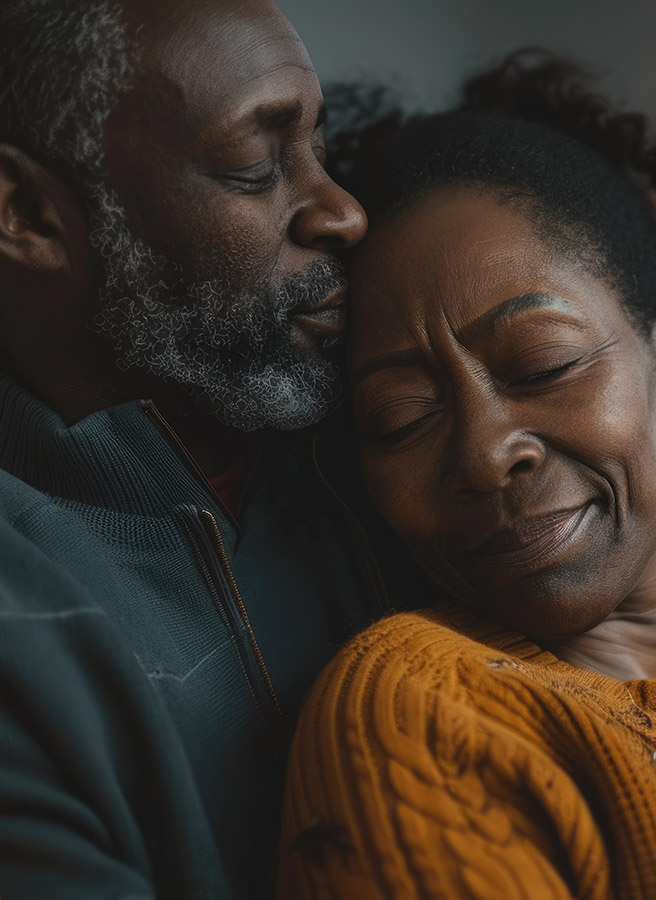Couples Counseling in South Jersey
It’s not too late to turn things around
It feels like you’re caught in an endless loop of arguments, silence, or just plain disconnection. You find yourself wondering how things got so hard, why conversations seem to turn into conflicts, or why the person you once felt so close to now feels so distant. Maybe trust has been broken, or maybe life’s constant demands have created a wedge between you and your partner. You might feel unheard, unseen, or unappreciated, and it’s left you questioning whether things will ever go back to how they used to be—or if it’s even possible to rebuild what’s been lost. Deep down, you’re yearning for clarity, peace, and a way to bring back the love and connection that seems to have slipped through your fingers.
At DBT of South Jersey, we understand how exhausting and lonely it can feel to navigate these struggles on your own. That’s why we’re here to help. In couples counseling at DBT of South Jersey, we provide a safe and supportive space where you and your partner can begin to unpack the hurt, communicate more effectively, and rediscover the connection that first brought you together. Our goal is to help you both feel seen and heard while working toward practical, meaningful changes that strengthen your relationship. No matter how far apart you feel right now, there’s hope—and together, we can work to bring you closer again.

The Benefits of Couples Counseling
Couples counseling is a supportive process designed to help you and your partner address the challenges you’re facing in your relationship. It provides a neutral, judgment-free space where both of you can openly express your feelings, concerns, and perspectives. The goal is not about placing blame, but rather understanding each other more deeply and working together to find solutions that strengthen your connection.
Through couples counseling, you’ll gain tools to improve communication, resolve conflicts, and rebuild trust. We’ll work on uncovering patterns or behaviors that might be keeping you stuck and explore healthier ways to interact and respond to one another. Whether you’re facing issues like recurring arguments, emotional disconnection, or navigating a major life transition, couples counseling can help you identify your shared goals and rebuild a stronger, more fulfilling relationship. It’s a collaborative process where our therapists at DBT of South Jersey guide you toward the changes you want to see, helping you create a partnership that feels supportive, respectful, and aligned with the life you both want to build together.
What can couples counseling help with?
Couples counseling provides a safe space for both partners to express their thoughts and feelings with the guidance of a neutral third party. It fosters mutual understanding and equips couples with tools to improve their relationship.
Couples counseling can address a wide range of issues to help improve a relationship. Here are some common areas where it can be beneficial:

Couples counseling can be incredibly helpful when you and your partner feel like you’re just not hearing each other. If you find yourselves repeating the same arguments or feeling misunderstood, therapy can guide you to communicate in a way that feels more open and productive. You’ll learn how to really listen to each other, express yourselves clearly, and address disagreements without the tension escalating. It’s not about changing who you are, but about learning how to connect in a way that brings more understanding and less frustration.
When the emotional closeness starts to fade, it can feel like you’re drifting apart, even though you’re both still in the relationship. Couples counseling creates a safe, supportive space where you and your partner can figure out what’s causing the emotional distance. Together, we’ll work on rebuilding trust and reigniting affection, helping you reconnect in a meaningful way. It’s all about nurturing a deeper bond and rediscovering the intimacy that may have been lost along the way.
Trust is the foundation of any strong relationship, and when it’s broken, it can be incredibly painful. Whether it’s due to infidelity, a past betrayal, or ongoing doubts, couples counseling offers a chance to work through these issues. It’s a place where you can address the hurt, take responsibility for your actions, and rebuild the trust that was lost. Therapy focuses on healing the pain and strengthening your commitment to each other, so you can feel more secure and confident moving forward together.
We all have those recurring arguments that seem to never get resolved, no matter how hard you try. Couples counseling helps you identify the patterns behind those disagreements and offers practical tools to manage conflict in healthier ways. It’s about working together to solve problems without the blame game or hurt feelings getting in the way. By approaching conflict calmly and constructively, you can start to break the cycle of fighting and build a stronger, more cooperative partnership.
Big life changes like having kids, switching careers, moving to a new place, or dealing with an empty nest can shake up your relationship in unexpected ways. Couples counseling is a great way to navigate these changes together, adapting as a team rather than feeling like you’re on different pages. It helps you stay connected and supportive through those transitions, so you can emerge even stronger as a couple, no matter what life throws your way.
Parenting can bring up a lot of disagreements, whether it’s about discipline, balancing responsibilities, or figuring out the best approach for your kids. Couples counseling helps you align on parenting strategies and create a united front. It’s not about agreeing on everything, but about finding a supportive way to collaborate as a team and address issues in a way that works for both of you and your family.
When there are differences in sexual desires or emotional intimacy, it can create distance between partners. Couples therapy helps explore these issues by offering a space to talk about your needs, expectations, and desires in an open, non-judgmental way. It’s about understanding each other’s preferences, finding ways to improve both physical and emotional intimacy, and reigniting the connection that may have dulled over time.
Differences in culture or religion can sometimes lead to misunderstandings or conflicts, especially when it comes to raising children or celebrating traditions. Couples counseling helps you navigate these differences by fostering respect and understanding. It encourages both partners to honor each other’s backgrounds and beliefs, finding a balance that allows both of you to feel seen, heard, and respected in your relationship.
Mental health struggles, such as anxiety, depression, or addiction, can take a toll on a relationship, making it harder to connect and support each other. Couples counseling helps you work through these challenges together, offering tools to cope with mental health issues in a way that strengthens your bond. It also provides strategies for handling external stressors, like work pressure or family concerns, so they don’t negatively impact your relationship.
Pre-marital counseling is a great way to start your marriage off on the right foot by equipping you both with tools to navigate the challenges ahead. You’ll learn effective communication, conflict resolution, and goal-setting strategies that will help you throughout your marriage. Plus, it allows you to talk through potential challenges early on, so you can go into marriage with a solid foundation and a better understanding of each other’s needs and expectations.
Couples counseling is all about strengthening the foundation of your relationship, building respect, teamwork, and shared values. Through therapy, you’ll align on long-term goals and develop a deeper understanding of what’s important to both of you. By working on your partnership in a supportive environment, you can create and foster a relationship that feels strong, connected, and fulfilling.
Sometimes, couples find themselves at a crossroads, wondering whether it’s time to stay together or part ways. Counseling can help you gain the clarity you need by addressing your concerns, communicating openly, and exploring your feelings about the future. For couples choosing to separate, counseling can assist in creating respectful and cooperative arrangements, especially when children are involved, so that you can both move forward in a healthy way, no matter what decision you make.

How DBT of South Jersey can help you heal and strengthen your relationship
At DBT of South Jersey, we offer couples counseling in addition to our other services because we understand that relationships can have their challenges. We’re here to help couples navigate those bumps in the road and come out stronger on the other side. Our goal is to help you and your partner communicate better, reconnect emotionally, and navigate conflicts in a healthier way. Using research-backed methods, we work with you to address issues like trust, emotional distance, and communication breakdowns, so you can create a relationship that’s stronger and more fulfilling.
What makes us different is that we focus on giving you real tools that you can actually use to improve your relationship every day. We know no two couples are the same, so we tailor our approach to fit your specific needs. Our team has expert training in evidence based practices, which will ensure you get results you are looking for in Couples Therapy. Let our team support your relationship by providing expert guidance to help you strengthen your bond and create a deeper connection.
What is The Gottman Method?
The Gottman Method Couples Therapy is a powerful, research-based approach to couples therapy that focuses on improving communication, resolving conflicts, and fostering emotional connection. A key aspect of the method is reducing the “Four Horsemen”—criticism, contempt, defensiveness, and stonewalling—which are harmful behaviors that can erode a relationship. Couples also work through the “Sound Relationship House” framework, which helps build a strong foundation based on trust, shared goals, and mutual respect. By learning how to manage conflict constructively and enhance intimacy, couples can create lasting positive change in their relationship.
At DBT of South Jersey, we are proud to offer this proven approach to couples therapy. We have clinicians with specialized training in Level 2 of The Gottman Method for Couples Therapy, as well as the Gottman approach to Treating Affairs and Trauma in relationships, providing even deeper, advanced techniques to help couples navigate more complex relationship challenges. Whether you’re dealing with communication issues, emotional disconnection, or any other relationship concern, this therapy is designed to help you strengthen your partnership and build a more fulfilling future together.
Couples Counseling FAQ
At DBT of South Jersey, we know every couple is unique, so we tailor our approach to fit your specific needs. Whether you’re struggling with intense emotions, communication issues, or mental health challenges, Dialectical Behavior Therapy (DBT) can help. DBT teaches emotional regulation, mindfulness, and healthier communication to manage conflicts and navigate tough emotions. We also offer the Gottman Method Couples Therapy, which helps couples improve communication, build trust, and deepen their emotional connection. Our therapists will collaborate with you to understand your relationship dynamics and create a customized treatment plan that best supports your goals, helping you build a stronger, more connected partnership.
Yes, couples therapy can definitely be worth it, even if it feels a bit intimidating at first. Relationships aren’t always easy, and therapy can give you both the space to understand each other better, improve how you communicate, and work through any issues that are getting in the way. If you’re feeling stuck or finding yourselves in the same arguments over and over, therapy can help you break those patterns and move forward.
It’s not always a quick fix, but the benefits are real. You’ll learn healthier ways to handle conflict, rebuild emotional intimacy, and get a deeper understanding of each other’s needs. It might take time and effort, but if both of you are committed, therapy can be a powerful tool to create a stronger, more connected relationship.
In couples therapy, it’s really important to be open and honest about what’s going on, even if it feels uncomfortable. The whole point is to work through your challenges together, and for that to happen, you both need to feel heard. If there’s something you’re struggling with, whether it’s a big issue like trust or something more personal, it’s important to talk about it, even if it’s tough.
What you don’t want to do is shut down or avoid certain topics by saying things like “I don’t want to talk about it” or “It’s not important.” That can make it harder for the therapist to help you and also prevent your partner from truly understanding where you’re coming from. The more open you can be, the better the therapist can guide you, and your partner will also gain a deeper understanding of your perspective. This can really strengthen your relationship and help you both work together on finding solutions. Therapy is a safe space, and by talking about everything—even the hard stuff—you’ll have a better chance at making progress and getting back to a healthier place together.
The length of couples therapy really depends on your goals and needs, but on average, most couples benefit from at least six months. In the beginning, it’s typically recommended to meet weekly. Weekly sessions help you build a strong foundation, tackle immediate concerns, and develop healthier communication habits. Over time, the frequency can adjust as you make progress and things settle down.
Throughout therapy, we’ll check in regularly to see how things are going and adjust the focus as needed. Some couples may continue longer to keep building on their relationship, while others may wrap up sooner. Even after therapy ends, occasional check-ins can be helpful to make sure things stay on track and to address any new challenges. Ultimately, therapy will be tailored to fit what works best for you and your partner, always aimed at creating lasting positive change in your relationship.
Deciding when to stop couples therapy really depends on what you and your partner need and want to achieve. Some couples may feel ready to end therapy once they’ve worked through their issues and strengthened their relationship. Others might prefer to continue for a bit longer to keep building on the progress they’ve made or address any new challenges that come up. Ultimately, the right time to stop is when you both feel confident and equipped to move forward on your own.
Your therapist will be there to help guide this decision by regularly checking in with you to assess how things are going. Once you’ve reached your goals and feel like you’re in a good place, it could be time to wrap up. That said, periodic check-ins down the road can still be helpful to make sure you stay on track and handle anything new that pops up.
Couples come to therapy for all kinds of reasons, and there’s really no set “perfect” time to start. Some couples reach out when they’re having trouble with communication, constant arguments, or feeling emotionally distant from each other. Others might be dealing with bigger issues like trust problems, infidelity, or navigating major life changes like becoming parents or switching careers. Some couples even come in just to strengthen their relationship and make sure they’re on the same page for the future.
In general, it’s a good idea to consider therapy when you feel like things aren’t improving, when you’re stuck in a negative pattern, or when you just want to make sure your relationship stays strong. The earlier you address challenges, the easier it is to work through them and keep things healthy before they turn into bigger problems.
The outcome of couples therapy really depends on what’s going on for each couple and how committed both people are to the process. While many couples do see positive changes, the results can look different for everyone. Things like how motivated you both are and what challenges you’re facing together all play a part in what happens next.
At the end of the day, couples therapy isn’t just about staying together—it’s about improving how you communicate, work through conflict, and create a healthier relationship, whatever that looks like for you. Whether that means staying together or parting ways with a better understanding of each other, the goal is to help you both move forward in a way that feels right for your relationship.
Couples therapy isn’t always the right choice, and it’s important to know when it might not be the best option. For example, if there’s ongoing domestic violence or abuse in the relationship, couples therapy is not recommended. The focus in those situations needs to be on ensuring safety first, which often means seeking individual therapy or specialized support to address the abuse. Couples therapy requires a basic level of safety and balance in the relationship, and that’s just not possible when abuse is present.
It’s also worth considering whether both partners are ready to engage in the process. For couples therapy to work, both people need to be committed to improving the relationship and willing to put in the effort. If one person isn’t interested or doesn’t want to work on things, it can make progress really challenging.
If you’re feeling unsure about your commitment to the relationship or are dealing with personal challenges that are affecting it, individual therapy can be a great first step. Starting in individual therapy at DBT of South Jersey can help you work through those personal concerns, ultimately creating a stronger foundation for couples therapy when you’re ready.
In couples therapy, the therapist’s role is to guide you both through the process of working together on the issues you’re facing. It’s not just about talking—it’s about actively engaging with each other while the therapist teaches you practical skills like better communication, how to resolve conflicts, and ways to strengthen your relationship. The therapist makes sure both of you feel heard and helps create an understanding between you, so that you can take what you learn in therapy and apply it in everyday situations outside the therapy room.
In couples therapy, the therapist will ask questions that help explore both the history of your relationship and what’s happening right now. They’ll want to understand how things have evolved over time, what patterns you’ve developed, and how you’ve been handling challenges. For example, they might ask:
- “How did you two meet, and what was the early part of your relationship like?”
- “What’s been one of the biggest challenges in your relationship, and how did you both work through it?”
- “How do you usually handle disagreements? What tends to happen during arguments?”
- “What’s been going on recently that feels different, and what do you think might be causing that shift?”
These questions help the therapist get a clear picture of both the good and the tough moments in your relationship. They also help make sure that both of you feel heard and understood in what you’re going through now. The goal is to dig deeper into what’s working and what’s not, so that you can build new strategies together for moving forward.
Your first couples therapy session is all about getting to know you and your partner, understanding what’s going on, and setting the tone for your work together. The therapist will start by explaining what therapy is all about, how it works, and what you can expect in the future. This helps create a sense of comfort so both of you feel safe enough to open up.
Throughout the session, the therapist will ask questions to learn more about your relationship’s history, your individual concerns, and the specific issues you’d like to tackle. They’ll want to understand how you communicate, how you deal with conflict, and what strengths you both bring to the relationship. This gives each of you a chance to share your side, so the therapist can get a better understanding of what’s happening and make sure both of you feel heard.
The therapist will also ask about your goals for therapy—whether you want to improve communication, work through recurring arguments, or rebuild intimacy. Understanding your goals will help guide the therapy process and ensure that you’re both working toward what matters most to you.
You’ll know couples therapy is working when you start noticing positive shifts in how you communicate, resolve conflicts, and connect with each other. Some signs of this might include when you start seeing more open communication with less defensiveness, healthier ways of resolving conflicts, and a deeper emotional connection with more affection. You’ll also notice progress toward the goals you’ve set for improving your relationship, whether it’s communication, conflict resolution, or intimacy.
Therapy can take time, so it’s important to be patient with the process. If you’re seeing these positive shifts, it’s a good sign that the therapy is working and you’re moving in the right direction. However, if you’re feeling unsure or not seeing progress, it’s always a good idea to discuss this with your therapist so they can adjust the approach to better fit your needs.
Yes, many couples do stay together after couples therapy, especially when both partners are willing to put in the work to improve their relationship. But it’s important to know that it’s not a guarantee. Therapy can help you address issues, improve communication, and reconnect, but success really depends on how much effort both of you are willing to put in and if your goals align. For some couples, therapy brings them closer, while for others, it helps them realize that parting ways might be the best option. Either way, therapy can help you better understand each other and move forward in the healthiest way possible.
Yes, it’s definitely possible for couples to argue during therapy—after all, therapy is about addressing the tough stuff. But the key is that therapy helps you handle those disagreements in a healthier and more respectful way. Your therapist will teach you both tools to manage conflict without things getting out of hand. Instead of avoiding the hard conversations, you’ll learn how to have them in a way that lets you express yourselves, listen to each other, and work together on solutions. It’s about breaking old patterns and learning to “fight fair” so the conversation stays productive and respectful.




